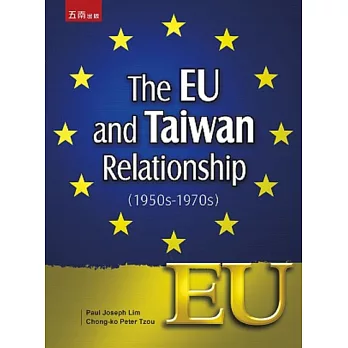作者簡介
Dr. Chong-ko Peter Tzou (鄒忠科)
PhD of Vienna University,Austria.
Present position is Professor of Graduate Institute of European Studies, Tamkang University, Taipei, Taiwan, was the former Director of Graduate Institute of European Studies and European Union Center Studies of Tamkang University.
His subjects are European Integration, European Union, European External Relations.
As Visiting Professor, has been in many European, American and Asian Universities, for example Vienna University, Mainz University, Munich University, Oxford and Cambridge University, First Rom University, UCLA, American University , Tokyo University, Waseda University ,Seoul University and Moskau University, etc.
Dozens of books and articles of European integration, European Union , European affairs and European External Relations, had been published. Such as” The History of European Union”, and” The Higher Education Integration in the EU and the Major Trends of the World Higher Education in the 21st Century”, etc.
Current research interest: Taiwan-EU Relations, The EU Energy Policy and Environmental Protection , the European Transitional Justice and Taiwan.
Dr. Paul Joseph Lim
Paul Joseph Lim is now a pensioner but since the 1 April 2013 is a Visiting Fellow of the Ministry of Foreign Affair of the Republic of China, Taiwan, hosted by the European Union Centre in Taiwan at the National Taiwan University.
Until December 2012, he was Professor and Head of the Centre for European Studies in the Institute for Occidental Studies (IKON), Universiti Kebangsaan Malaysia which he joined in 2010. He had served 5 years in Universiti Sains Malaysia (2002-2007) as Coordinator of the European Studies Programme. The rest of his employment history had been as a Co-Founder of the European Institute for Asian Studies (EIAS), Brussels, in 1989 and becoming its Research Coordinator and lastly its Acting Deputy Director between 2007 and 2010. However, he has also been a Political Adviser for Asia with a political group in the European Parliament in the late 1980s and 1990s.
He obtained his Licence and Doctorate at the Université Catholique de Louvain, Belgium.
As a researcher, Dr. Lim’s focus is on the European Union’s External Relations, in particular, with Asia in its different facets.
His latest publications in 2013 were “European Union’s Statements on Asia security” in “Strategic Vision for Taiwan Security”, Volume 2, Issue 10, August 2013, magazine of the Center for Security Studies, Institute for International Relations, National Chengchi University, “The European Union’s cooperative relations with Asia with a look-in on: Disturbances and Regional Challenges in East Asia” in the Tamkang Journal of International Affairs, Volume XVII, No. II and “What has ASEAN offered or could offer to the European Union in their relationship” in ASEAN Outlook, December 2013, No. 008, publication of the Taiwan ASEAN Studies Center of the Chung-Hua Institution for Economic Research.
His Fellowship in Taiwan in his retirement is researching and writing a book on Taiwan-EEC/EEC-Taiwan Relations in the 1970s in cooperation with Prof. Chong-ko Peter Tzou which will be published in Taiwan in 2015.
